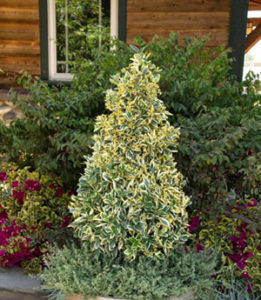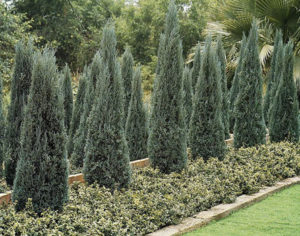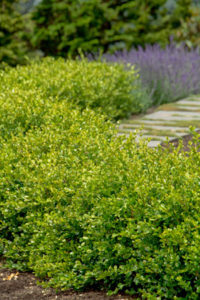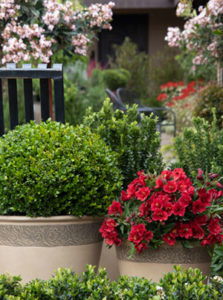Looking to set your landscape apart from the rest of your neighborhood? It may be faster and easier than you think. One way to add instant and long-lasting beauty to your landscape is by using statement plants. Those varieties that lend your garden, deck, porch, or patio a bold, architectural look filling spaces with drama and impact.
“Statement plants are the difference between an ordinary yard and a beautiful garden,” says Jonathan Pedersen of Monrovia. “Make your landscape a source of inspiration and pride, an extension of your personality. Plants help you do that.”
A pair of Green Tower® Boxwood pruned as spiral topiary add year-round beauty to a front entry.
There is a rich history in gardening going back centuries. Dig in and you will discover how statement plants can be used to effectively design stunning landscapes. Classic examples of how statement plants have been used include as focal points and to divide and separate garden spaces. Also to help direct movement through the garden. All of this while lending life and structure to both big and tiny gardens. “Think of the statement plant as the jewel and the surrounding garden as the setting,” says Margie Grace, Landscape Designer and author of Private Gardens of Santa Barbara: The Art of Outdoor Living. “You can pair the loveliest of accessories (the “statement plant”) with the simplest of settings (think “little black dress”). Done thoughtfully, this approach yields an elegant composition.”
Use a Statement Plant as a Focal Point
Perhaps the most straightforward way to use a statement plant in your landscape is as a focal point. “Every space needs a focal point, a place where the eye is drawn to,” says John Robert Beaudry, Landscape Designer and author of the new book Garden Sanctuary: Designing for Comfort, Wholeness and Connection. “Having a place for the eye to stop makes a garden feel more restful. The right focal point can be something that lifts spirits or adds excitement.”
To do this in your landscape, select a plant that offers an architectural or dramatic shape. For example, a wealth of shrubs and small trees are pruned as topiaries (trees and shrubs pruned in ornamental shapes). Green Tower® Boxwood or Mint Julep® Juniper pruned into spirals look dramatic flanking a front door.
Trellised shrubs and vines (those trained vertically on a trellis), and espaliered trees. (Trained to grow in a pattern along a frame.) For instance, Yukon Belle® Pyracantha are eye-catching ways to add beauty to a garden space with their dramatic, architectural forms.

Use a Statement Plant to Define a Space
In addition to focal points, you can use statement plants to great effect. This beautifully divides your garden into different areas or rooms. Separating your spaces into a series of rooms with statement plants like espaliered Chollipo Euonymus. This makes a garden stroll an experience in discovery.
Or try planting a few large evergreen shrubs together to create a natural wall. You can do this effectively both planted in the ground and in large containers. Emerald Colonnade® Holly and Waxleaf Privet, for example, both offer dense green foliage. This makes them beautiful choices for a living screen that separates one space from the next. Such as a dining area and your cutting garden.

Use Statement Plants to Guide Visitors
Statement plants can do double duty in your landscape. Enjoy their beautiful architecture and use them to influence how you and your garden visitors move through your garden. Planting a line of Purple Fountain Grass, for example, serves as a barrier. This is to prevent visitors from walking through and staying along a pathway. Plus, their graceful form adds a sense of movement.
Alternatively, planting a low hedge, such as Boxwood can serve as beautiful, yet functional design element. Boxwood shows off dense, deep green leaves. This makes it an ideal choice for keeping visitors moving from your side yard to your backyard, for example.
Statement Plants for Natural Gardens
Topiary fits many design styles but is not for everyone. If you prefer a more natural look, select beautiful plants that make a statement with their form, texture, or color. Japanese Maples and other small trees are classic choices for this. Japanese Maples bear finely cut leaves and often show off a dramatic, sculptural shape that catches the eye. Grow them in the ground or in large containers for different, yet equally beautiful, effect.

Add Statement Plants to Your Decks, Patios, or Porches
Statement plants add as much grace and beauty to outdoor living areas. (Including decks, patios, and porches) as they do in your garden. For example, pair a set of poodle topiaries flanking the stairway leading down from your deck. (Those pruned with sections of trunk separating spheres of foliage). Or add height, architecture, and privacy to your patio by placing a few topiaries along its perimeter. Beautify your deck with a pair of Lemon Swirl® Australian Brush Cherry topiaries shaped as spirals. Go for high drama and wall of heat-resistant color with Purple Queen® Bougainvillea artfully grown on a trellis.

